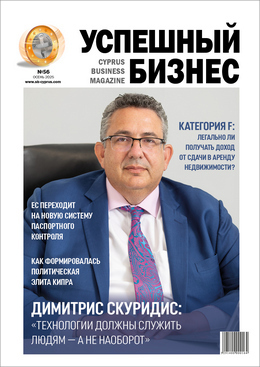In an era where the regulatory landscape grows increasingly complex, the role of legal counsel has never been more critical—particularly in industries like event management and renewable energy, where rapid evolution and high stakes meet. Stella Koukounis, an experienced lawyer, managing partner of Solsidus Law, shares insights into the legal obstacles that businesses must overcome, how to protect intellectual property in a world of instant media, and the delicate art of negotiation in high-stakes land deals.
Your firm has extensive experience providing legal counsel in the media and entertainment sectors. A prime example is your legal support for one of Cyprus's largest electronic music festivals. Could you elaborate on the legal services required for such an event? Let's use this as a case study to discuss the broader event management industry.
Indeed, organizing a music festival involves a significant range of legal considerations. In addition to providing guidance on communication strategies through our media network, our primary role from a legal standpoint, centers around negotiation of terms of business with various stakeholders that participate, support or even perform at the events. For example, there’s negotiation of terms with the internationally renowned artists and their agencies, and ensuring these terms are valid from a Cypriot law perspective. A key point here is to ensure that the festival organisers fully understand their responsibilities and exposure and are protected from potential risks.
Another crucial area is employment contracts, particularly for the personnel and specialists essential to run the event from start to finish. Legally supporting a large-scale international music festival, we have gained experience reviewing, negotiating, and enforcing a large scope of contracts and across wide spectrum of disciplines. Amongst other professionals, regulators and performers, these include contractors responsible for constructing key elements of the stage and infrastructure, so ensuring that our clients' are shielded from liability throughout the process.
Aside from contracts with artists and personnel, could you elaborate on other logistical or legal challenges that often arise in these events?
Certainly. One critical aspect is ensuring that all contractors are fully licensed and insured. This is vital to prevent any accidents from exposing the organisers or directors to liability. Of course. Insurance is a key consideration that we’ve also been involved in securing. Beyond that, logistical challenges can also pose significant legal hurdles. For instance, we encountered a situation where stage equipment was delayed at customs, and the organisers had exhausted all the standard channels to resolve it. While it may seem like a minor issue—after all, we were dealing with simple light bulbs for decoration – the complexity of the matter was far greater. It required us to navigate intricate customs regulations, which sometimes involved a deep understanding of electromechanical components. Although it may appear on the outside the typical scope of legal services, it ultimately boils down to applying and interpreting the law correctly.
There are numerous hidden details that, if mishandled, can lead to major complications. Event management and entertainment law have evolved significantly over the past five to ten years, presenting new challenges that didn't exist before. One of the more unexpected issues is the legal implications of photographing people and distributing those images without their consent. This is an area that companies must take seriously, as it can lead to substantial legal risks. As a lawyer, I always consider the worst-case scenario – what could go wrong, and what is the potential liability for the directors?
Given my advisory role to the board, directors, and employees, it's critical to ensure that no one is exposed to legal jeopardy due to lapses in procedure. GDPR is only part of the equation. Equally important is ensuring proper coordination with the event producer's media team, who are often unfamiliar with the legal nuances of obtaining consent. For example, photographers at a festival might capture beautiful crowd shots, but the key legal questions remain: How do we secure consent to use those images? Where and when can they be published? These are crucial legal considerations we address when supporting such events.
What advice would you give to organisers of large events? Is it enough to simply place a sign at the entrance stating that photographs will be taken, and by entering, attendees consent to the publication of their images?
Photographing attendees is primarily an intellectual property (IP) issue, rather than just a contractual one. While it is part of the broader agreement with attendees, we needed to ensure that Cyprus's IP laws are sufficiently addressed. For the specific festival we advised on, we conducted a thorough review of the terms and conditions over two consecutive years. While today it might be tempting to rely on AI to generate terms and conditions for an event, it's crucial to ensure that each clause aligns with local laws. Back in September 2022 and the first time ever such a festival was taking place, there was no ChatGPT, the event was taking place on the back of a pandemic and amidst geopolitical unrest, so it was pretty much ‘hands on’ with compliance with Cypriot regulations.
At the time, we did a lot of research into terms and conditions from other international festivals to stay informed on evolving industry practices. Just two years ago, large music festivals were still a novelty in Cyprus, with the first major event held in September 2022. Now, cities like Limassol host mini-festivals almost every week. This growth is positive for the industry but it also introduces new legal and safety concerns.
There are so many events in Cyprus these days. Our magazine organises several, and we have noticed that event management becomes more complex each year, with a growing number of laws and regulations. Could this overwhelm small players who can’t afford high legal fees?
I completely understand your concern. It is true that as regulations increase, organising events becomes more intricate, especially for smaller players. But preparation is key. Let me outline the essential areas your readers should focus on when planning an event.
Regulatory law (including compliance with health and safety regulations) as well as labour law are two critical areas. Regulatory considerations ensure that there’s the appropriate license by the municipality to host an event. Labour law protects the persons who are engaged and work at the event. Labour inspectors often visit events to ensure that all workers are employed under appropriate conditions. For one festival, we had to create a comprehensive health and safety plan from scratch because the organisers had no prior experience with large-scale events. When you are dealing with tens of thousands of attendees, safety becomes a top priority. It’s crucial to ensure that all attendees are aware of how they should conduct themselves, which must be clearly stated in the event’s terms and conditions.
For example, we had to coordinate with several authorities, including the local municipality and health and safety inspectors. They conduct spot checks during events, so we had to be fully informed of all relevant regulations. It’s not just a matter of compliance—questions like "What happens if someone gets injured?" or "What role does the security company play?" need to be addressed thoroughly in advance. In our first year, we handled the entire health and safety plan ourselves.
Every event must be licensed by the appropriate authorities, which often requires extensive communication with municipalities. This can involve a degree of lobbying to ensure that both producers and organizers meet the stringent terms set by regulatory bodies.
Let’s move to the second subject of our conversation: renewable energy. What are the challenges that most businesspeople overlook when investing in solar energy?
One of the first questions they typically ask is, “Where do I find suitable land to build a solar park?” This is where we depend on expert advice, as we are not architects or civil engineers. However, through consultations with specialists who have worked on similar projects internationally, we gain a clear understanding of the type of land that is best suited for such installations. That is the initial step.
The second step involves negotiating with the landowners, and this is where negotiation skills become critical. Investors rarely approach us when things are progressing smoothly—they come to us when they've hit a roadblock. For example, they might have a verbal agreement with a landowner who later decides to withdraw from the deal. Negotiating with Cypriot landowners, who often have a deep emotional connection to their land, requires a great deal of sensitivity. These owners want to feel assured that they are getting the best possible deal or that they will regain control of their land after 10 or 20 years, once the investor has achieved their return on investment. It is all about managing expectations and building trust to move the process forward.
Your negotiation skills must also come into play when it comes to discussing the price, correct?
Yes, absolutely. A key part of the process is ensuring that both sides have a realistic understanding of the deal. Landowners often overestimate the financial value of their property, believing it to be worth millions due to sentimental attachment, when in fact, the market value is quite different.
The first priority is building trust with all stakeholders. Once trust is established, we can address regulatory matters, which often involve collaboration with engineers and the electricity authority—areas where delays are not uncommon.
Another critical aspect we've learned is the importance of on-site visits. While our role is primarily advisory, understanding the physical landscape is crucial. There's a growing concern about the environmental impact of developing solar parks on natural spaces. International investors are typically sensitive to these environmental issues, but many local landowners focus primarily on immediate financial returns. They are eager to capitalise on their land, sometimes overlooking the potential long-term environmental damage.
These concerns frequently arise during negotiations and when drafting terms of use, as foreign investors may not fully understand local land regulations, and local owners often require proper guidance to navigate these complexities.
I can’t miss asking you this final question about your personal career. How did you decide to become a lawyer?
A year before I graduated from Lyceum, I had my career path all planned out. I was set to become an English literature teacher. I had been accepted to the University of Texas at Austin, which I am still incredibly proud of. I was going to study English literature and psychology, and after visiting the campus with my parents, I was filled with excitement about the future.
Then, one day at just 16, I participated in a career exploration week in Paphos, my hometown, where we were encouraged to visit different businesses and professions. During a visit to the local court, everything changed. As soon as I stepped into the courtroom, I was mesmerized by the legal proceedings and the people involved. By the end of that experience, I realised that law was a much better fit for my personality.
I served in a few managerial positions and lead teams, prior to setting up on my own firm. While launching my firm in 2015 I was representing a Swiss family office and the position depended on my cooperation with professionals from various disciplines such as accounting, tax, strategy and investments. Being able to wear several hats is what has shaped my view of legal practice and guides how we practice here at Solsidus Law.
Stella Koukounis has been practicing law in Cyprus for over 16 years, with a particular focus on corporate, commercial, banking, and financial law. At the beginning of her career, she was appointed as the head of the corporate department of a leading corporate services provider, and later became the legal advisor and representative of a Swiss family office and its operations in Cyprus. Stella is a frequent speaker at conferences in Cyprus and abroad on topics such as corporate law and leadership, ESG and due diligence, and corporate financing in renewable energy transactions. Recently, Stella was invited to lecture on corporate, commercial, and financial law.







